The PKR election results are in. As expected, favoured Nurul Izzah Anwar secured a decisive win for the deputy president position, defeating Rafizi Ramli. Yet, the results point to serious challenges for the party and its leadership; power consolidation has come with costs that weaken the party ahead.
While PKR looks to be able to avoid a devastating split - as a result of the modest victories of a handful from the Rafizi camp - the campaign and questions about money politics will overshadow the party ahead. Unless PKR takes decisive steps, its leadership will face difficulties in strengthening the party moving forward, especially as it now faces important state elections in Sabah, Sarawak, and Malacca.
Let’s look at the results in more depth and their implications.
Inclusive markers
Let’s start with the positive, the inclusiveness of the election outcome. This dimension has received less attention but is important. The PKR party polls showcase its greater inclusion of women and multi-ethnic foundation compared to other parties in Malaysia.
Nurul Izzah’s win is the first victory for a woman at the deputy leadership position in any party in a competitive contest. Her mother, Dr Wan Azizah Wan Ismail, previously held the PKR presidency but was not seriously challenged in previous party polls. As such, the 2025 results are an important step for women in Malaysia’s national politics. The inclusion of women as 41 percent of the delegates contributed to the support for Nurul Izzah.
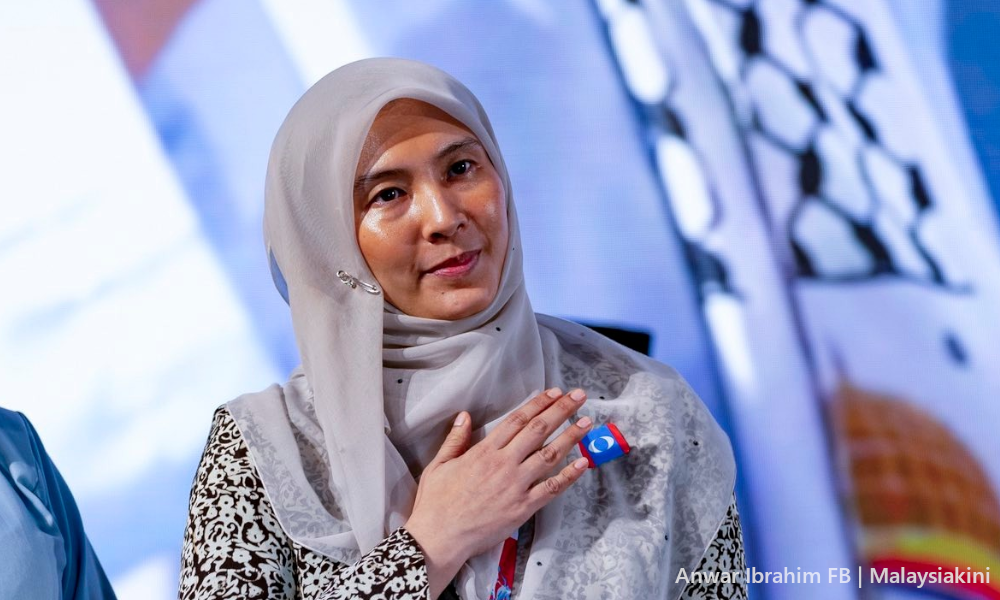
Women, however, were less successful in the central leadership council, securing only three out of 20, or 15 percent, of the positions, and none ran for the vice-presidency. This was a product of women not running for these positions, signalling that the leadership of the party is still largely men.
It is important to appreciate that younger delegates were also prominent, which differentiates PKR from other parties. Youth delegates comprised 39 percent, another indicator of inclusiveness.
The results also reflect the multi-ethnicity of the party, with the three major groups in Peninsular Malaysia - Malay, Chinese and Indian - among those elected for vice-president and within the central leadership council - 12 or 60 percent, five or 25 percent, and three, or 15 percent.
The elected representation of Sabah and Sarawak is minimal, however - Abg Zulkilfi Abg Engkeh in the central leadership council is the exception – highlighting the weakness of the party in Borneo.
Camp head deposed but no campfire
The inclusiveness extends to the winners of the two main factions. Both the camps of Rafizi and Nurul Izzah won, with Rafizi’s camp securing two of the vice president slots. Another in his camp, Nik Nazmi Nik Ahmad, lost by only 101 votes to another Rafizi ally, Chang Li Kang.
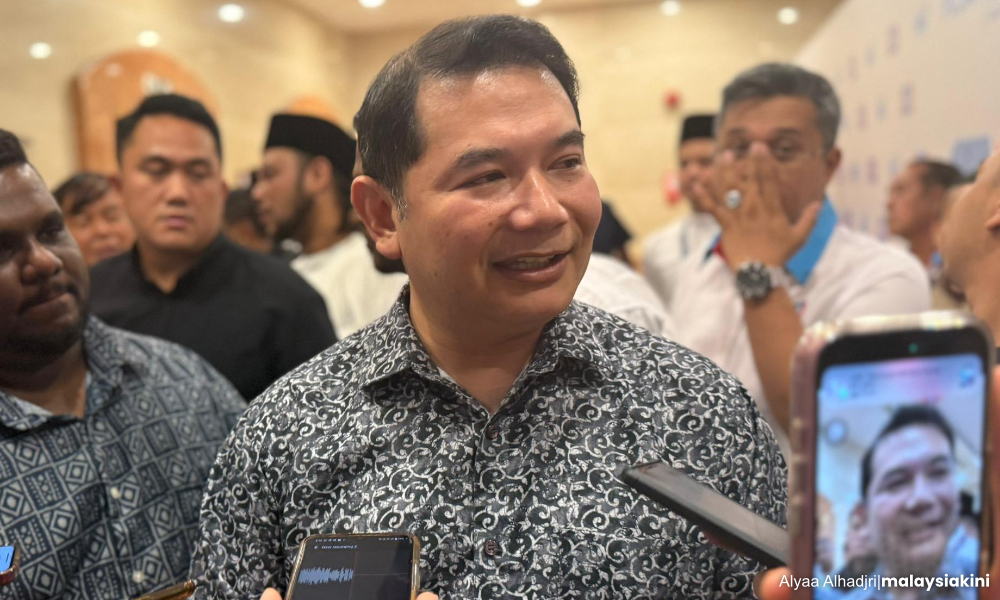
Nurul Izzah endorsed one of the candidates supported by Rafizi, Negeri Sembilan Chief Minister Aminuddin Harun. This showed that there was some degree of compromise and that being loyal to Rafizi did not preclude individuals from victory. The main dynamic was about replacing Rafizi rather than his allies.
Where the difference in the party faction loyalties was most evident was in the central leadership council results that showed significant victories for allies loyal to Nurul Izzah, a total of 15 just endorsed by her out of the 20 positions. Two others - Petaling Jaya MP Lee Chean Chung and Ledang MP Syed Ibrahim Syed Noh - were endorsed by both deputy candidates.
The only Rafizi-endorsed winner in the central leadership council was Johor Bahru MP Akmal Nasrullah Mohd Nasir. This contrasts sharply with the long list of Nurul Izzah allies now in the council.
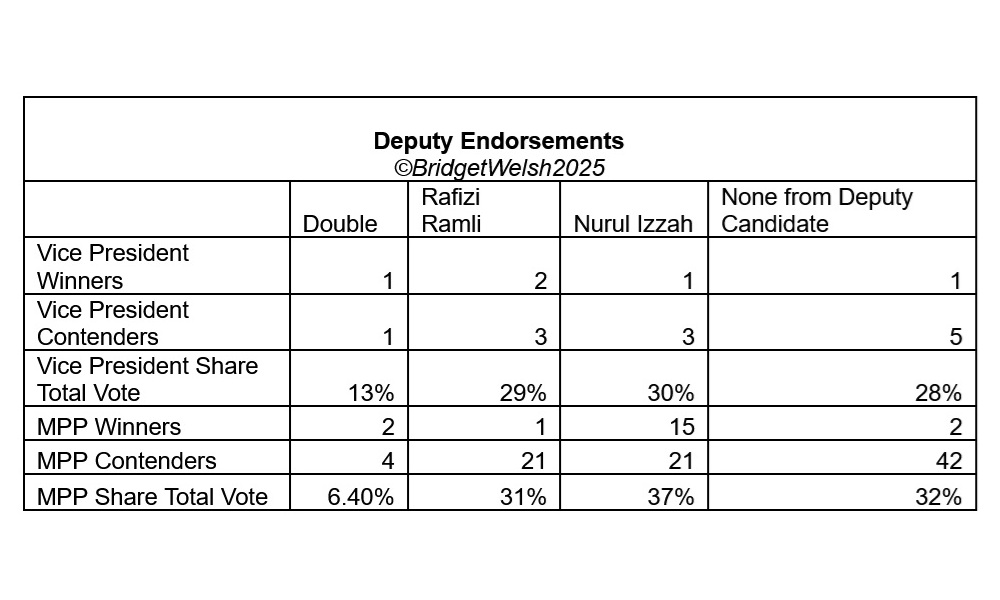
Being endorsed - even double-endorsed - did not secure victory, however, as two such candidates did not win. There were also a handful of candidates who won without any support from the deputy president contenders. Some candidates made it on their own merit, such as Nor Azam Karap from Perlis for a central leadership council post.
Most of the non-endorsed winners were close personal allies to the prime minister, such as council post winner Maszlee Malik and new vice-president Ramanan Ramakrishnan, the latter who was accused of “gangster” and money politics in the campaign and emerged with the second highest votes in the VP contest.
Review electoral process
Many accusations have been made about the party’s electoral process, individually and collectively. The analysis of voting shows that both camps secured considerable shares of votes, including those who were not endorsed.
Excluding double-endorsed candidates, Rafizi allies won 29 percent of the total vote for the VP contest and 31 percent of the total vote for the central leadership council contest, while Nurul Izzah secured 30 percent and 37 percent, respectively. Another third was won by those not endorsed at all.
Numerically, this voting pattern indicates that the ballot process did allow for diverse views; as such, the integrity of the vote was not compromised. Delegates made choices.
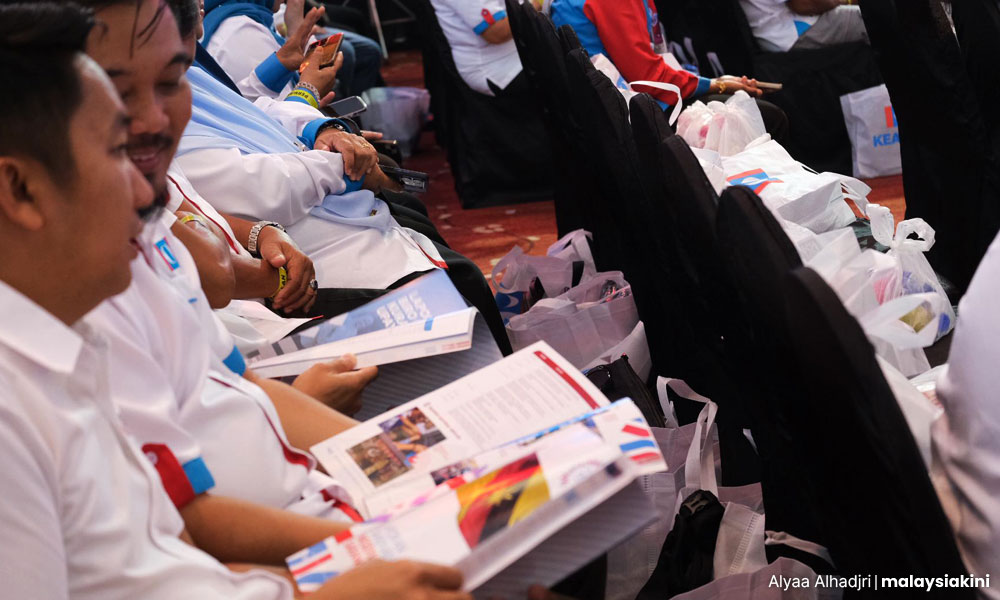
Concerns with the process remain, nevertheless. First is the low voter turnout. Only 62 percent of delegates voted for the senior leaders, 56 percent for the women’s wing, and 50 percent for the youth wing. This is low, especially when one compares it to other parties where delegate turnout is higher, such as Umno. It undercuts the legitimacy of the party polls within the party ranks.
Most of the delegates who voted were physically present for the congress in Johor, rather than those online and at the divisional level. This suggests that the online process did not engender the participation that was expected and should be reviewed. More steps should be taken to facilitate participation; holding an election on a working day, for example, is less than ideal.
It, however, should be noted that the 2018 14th general election (GE14) polls were held on a Wednesday, and when voters are inspired, they vote. More could have been done to reverse the non-democratic measures that have curtailed voting by members, including in the campaign. Making the campaign largely about the personalities of two people (arguably three, if one includes the prime minister) was inadequate.
The most concerning electoral issue is the use of money politics in the polls. To date, these concerns have been downplayed/ignored and those facing these accusations empowered. PKR risks further intrusion of Umno/BN-like practices into its ranks, which undermines its credibility.
That these concerns were one of the main issues in the campaign, they merit further independent review/investigation. Failure to do so will further undercut legitimacy and sow resentments inside the party, reducing PKR’s reform credentials at a time when this is already happening. The view that PKR is just like Umno is increasingly widely held publicly, an issue the party faces in tests in the coming public state polls.
Multiple push factors against Rafizi
Rafizi is being given credit for standing up for electoral concerns and calling out the leadership for a perceived systematic undercutting of his leadership. By some, he is seen as a hero. Others see his actions differently, with a failure to appreciate other factors contributing to his defeat.
These drivers include failures as a minister in policy implementation, such as the Central Database Hub (Padu), the subsidy rationalisation scheme, and the progressive wage policy, to name just the most well-known. Also, many speak of his lack of willingness to be a team player, to listen/support the work of other ministers, and respect for alternative views.
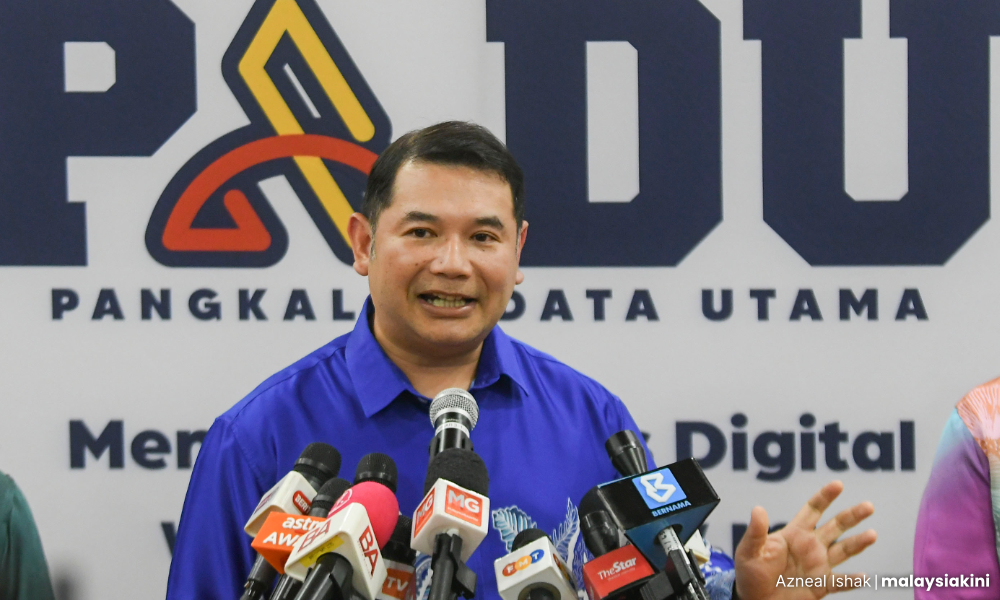
His confrontational style evoked, maintained, (and alienated) support - although netting nearly a third of all votes within the party, but support dropped compared to the 2022 party election. Rafizi’s persona and performance were in part responsible, especially given that many of his key senior allies were reelected.
Time will tell what role Rafizi will play ahead, but a resignation was a promise of the campaign if he lost. Time will tell whether lessons are also learnt from this experience. Time will also tell how his agitation has affected the views of the party.
For now, damage was done in terms of public standing. That Rafizi’s opponents opted not to engage in personal attacks nor ratchet up negative campaigning, and instead engaged in a modest compromise with endorsements, de-escalated internal party conflict.
The differences and passions remain, nevertheless, and the resentments are unlikely to ease in the short term. The history of PKR has shown that these issues can take a life of their own.
Not easy place for Nurul Izzah
A greater burden of party leadership now turns to Nurul Izzah. Being a woman leader will be difficult. She faces deep-seated misogyny, including among some of her fellow leaders. She has limited governance experience and will need to build these credentials. A failure to do so will undercut public support and possibly open her up to party challenges in the future.
She will also face the difficult task of engaging her father, who has allowed alternative voices to be raised, but has yet to make hard, needed reform decisions that show he is listening, such as that on the leadership of the MACC. Nurul Izzah will now face high expectations to push for much-needed reforms.
Unlike other leaders, her name and family ties may be an obstacle as she is both family and a foil for criticism against Anwar, one not holding any government position to implement reforms. Daughters questioning fathers, especially one where power is increasingly centralised, is not easy.
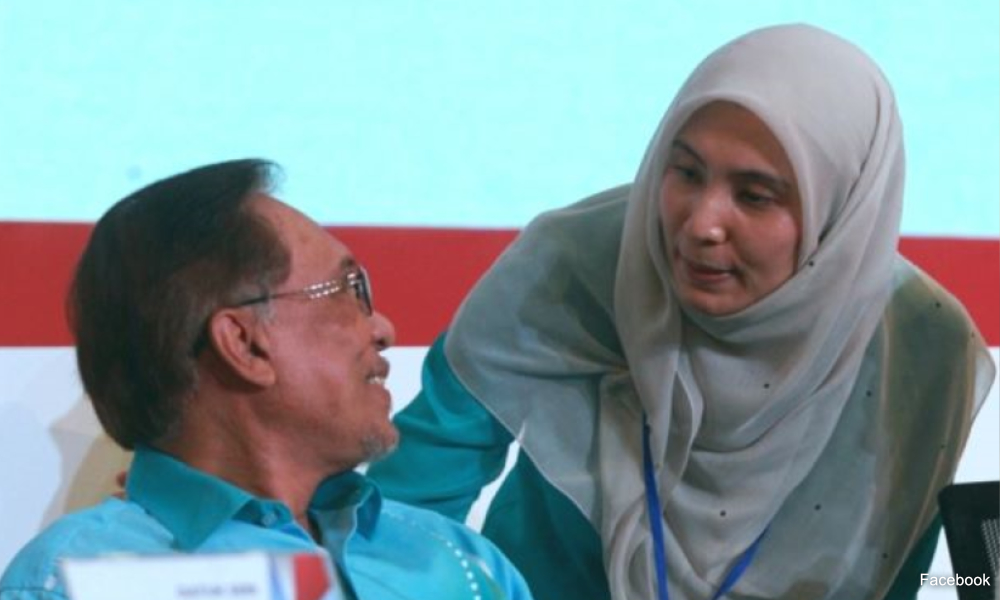
As with Rafizi, Nurul Izzah’s role will evolve. Also, as with Rafizi, the biggest challenge will be to implement reforms in the Madani government, which has shown it is not willing to make meaningful political reforms. It is not an easy place to be. A place to start is with a review of the PKR election process and work on building public credibility.
PKR may have new leadership, but the challenges it faces as a party that promised political change and has yet to deliver it remain serious. The party is facing a process of delegitimation among its political base. For good and bad, the party election has put a spotlight - even a glare - on the reform deficits.
The infighting during the election has made the party weaker, but it has not left the devastating polarisation/split as was seen after the Sheraton Move. Differences were aired, and the damage internally has an opportunity to heal if managed well. Rafizi’s camp is not the same as Azmin’s in their political outlook.
Looking ahead, the question is whether, with Anwar’s increased power consolidation, he chooses to continue ignoring party and public calls for change. He does so at his own and party’s political peril, and with Nurul Izzah now in the deputy position, that of his family as well. - Mkini
BRIDGET WELSH is an honorary research associate of the University of Nottingham’s Asia Research Institute, a senior research associate at Hu Fu Centre for East Asia Democratic Studies, and a senior associate fellow at The Habibie Centre. Her writings can be found at bridgetwelsh.com.
The views expressed here are those of the author/contributor and do not necessarily represent the views of MMKtT.




No comments:
Post a Comment
Note: Only a member of this blog may post a comment.